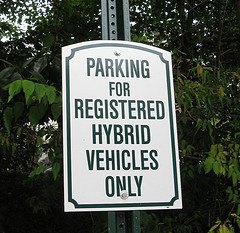Japan To Set World Standard For Hybrids And EVs

The United Nations UNECE World Forum for Harmonization of Vehicle Regulations is likely to adopt many Japanese safety rules for hybrid and electric vehicles as a global standard, says the Nikkei [sub].
Currently, there are no ECE safety standards for hybrid and electric vehicles. Japan has pushed its domestic safety rules to be adopted as international standards. Chances for adoption are good, Japanese companies and rulemakers are the pioneers in the field. Europe, which usually dominates ECE rule making, is lagging behind in the development of hybrid and electric vehicles, and doesn’t have much to lose if the Japanese standards are accepted.
53 countries are members of the World Forum for Harmonization of Vehicle Regulations. They implement the well over 100 ECE regulations to varying degrees. The EU usually adopts most ECE regulations. By the end of 2008, Japan had included 35 ECE regulations in its JASIC rules. (Quite curiously, the most fervent adopter of ECE regulations is the Russian Federation. By the end of 2008, Russia had signed 123 of the 127 ECE regulations into law. The EU had adopted 105.)
If Japanese rules for hybrid and electric vehicles are adopted as global standards, Toyota and Honda should be the main beneficiaries. They will be able to continue selling their Prius and Insight hybrid vehicles without much modification.
Notably absent for the World Forum are the U.S.A. and Canada. Many other countries, even if not formally participating in the 1958 agreement, recognize the ECE Regulations and either mirror the ECE Regulations in their own national rules, or permit the use and importation of ECE-approved vehicles, or both.
Hopefully, worldwide adoption of Japan’s standards for hybrid and electric vehicles will entice Japan to adopt more ECE rules. It would be a big step towards a world of internationally accepted safety and emission regulations, a world from which the U.S.A. decided to isolate itself. Which is one of the reasons why U.S. car exports don’t fare too well in the world.

Bertel Schmitt comes back to journalism after taking a 35 year break in advertising and marketing. He ran and owned advertising agencies in Duesseldorf, Germany, and New York City. Volkswagen A.G. was Bertel's most important corporate account. Schmitt's advertising and marketing career touched many corners of the industry with a special focus on automotive products and services. Since 2004, he lives in Japan and China with his wife <a href="http://www.tomokoandbertel.com"> Tomoko </a>. Bertel Schmitt is a founding board member of the <a href="http://www.offshoresuperseries.com"> Offshore Super Series </a>, an American offshore powerboat racing organization. He is co-owner of the racing team Typhoon.
More by Bertel Schmitt
Latest Car Reviews
Read moreLatest Product Reviews
Read moreRecent Comments
- Probert They already have hybrids, but these won't ever be them as they are built on the modular E-GMP skateboard.
- Justin You guys still looking for that sportbak? I just saw one on the Facebook marketplace in Arizona
- 28-Cars-Later I cannot remember what happens now, but there are whiteblocks in this period which develop a "tick" like sound which indicates they are toast (maybe head gasket?). Ten or so years ago I looked at an '03 or '04 S60 (I forget why) and I brought my Volvo indy along to tell me if it was worth my time - it ticked and that's when I learned this. This XC90 is probably worth about $300 as it sits, not kidding, and it will cost you conservatively $2500 for an engine swap (all the ones I see on car-part.com have north of 130K miles starting at $1,100 and that's not including freight to a shop, shop labor, other internals to do such as timing belt while engine out etc).
- 28-Cars-Later Ford reported it lost $132,000 for each of its 10,000 electric vehicles sold in the first quarter of 2024, according to CNN. The sales were down 20 percent from the first quarter of 2023 and would “drag down earnings for the company overall.”The losses include “hundreds of millions being spent on research and development of the next generation of EVs for Ford. Those investments are years away from paying off.” [if they ever are recouped] Ford is the only major carmaker breaking out EV numbers by themselves. But other marques likely suffer similar losses. https://www.zerohedge.com/political/fords-120000-loss-vehicle-shows-california-ev-goals-are-impossible Given these facts, how did Tesla ever produce anything in volume let alone profit?
- AZFelix Let's forego all of this dilly-dallying with autonomous cars and cut right to the chase and the only real solution.


































Comments
Join the conversation
The U.S. standards have often been ahead of everyone else's. When I lived in Germany in 1984 the Europeans were just starting to introduce lead-free gasoline so they could have stronger emission controls (with catalytic converters). One of the big debates I heard was whether laminated windshields should be required. With the increased globalization of the auto industry since then, however, global standards make a lot of sense.
hm, I wonder if a pure EV parked in front of the sign in the picture would get a ticket...